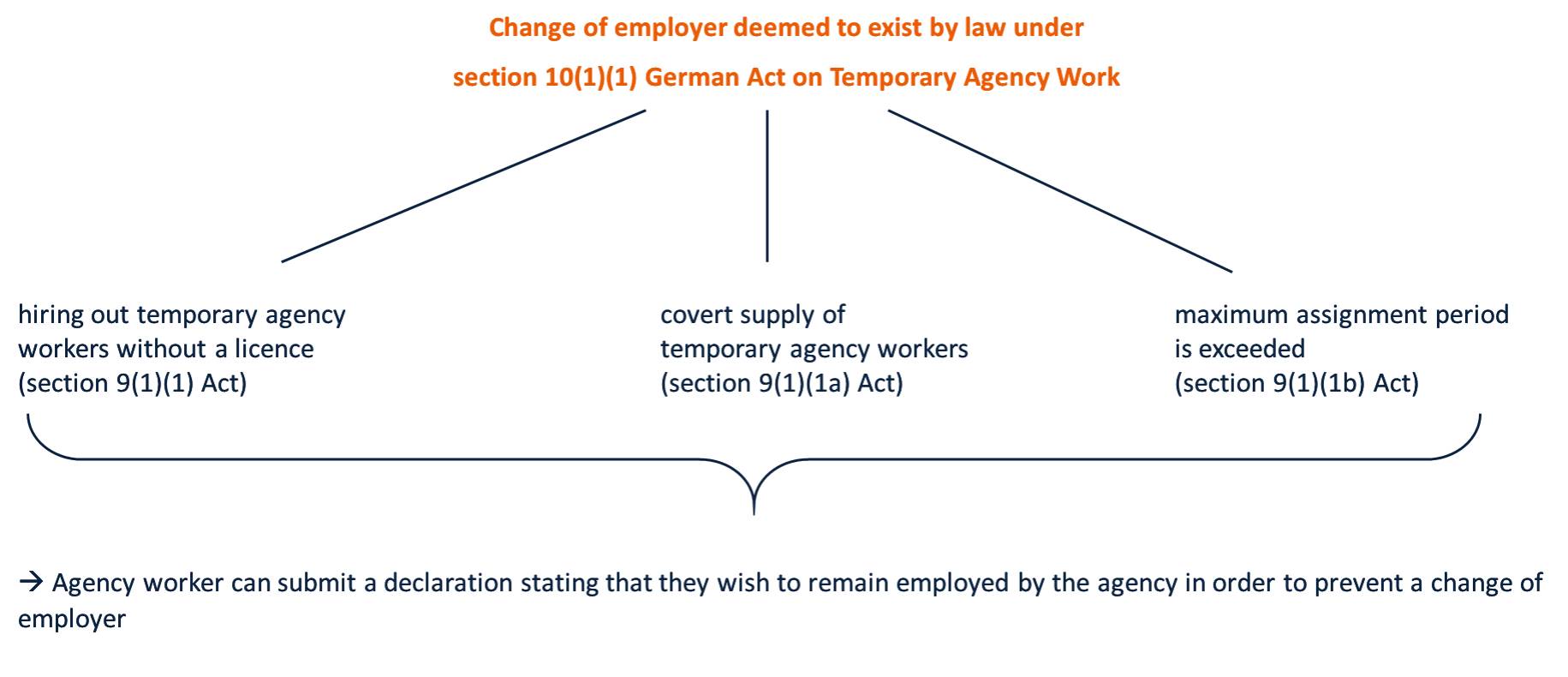FAQ on temporary agency work legislation reforms: Part 3 – Declarations asserting right to remain with agency
With the “German Act Amending the Act on Temporary Agency Work and other Acts”, which came into force on 1 April 2017, a new form of constitutive declaration, a “status quo declaration” (Festhaltenserklärung), was introduced to protect the freedom of occupation of temporary agency workers. By submitting a written declaration that they wish to remain employed by an agency, temporary agency workers have the possibility to object to an automatic change of employer deemed to have taken place by law. Otherwise, this change provided for in the German Act on Temporary Agency Work (the “Act”) would be constitutionally questionable.
We have examined this novel form of declaration of intent and its legal consequences in detail and would now like to cast some light on the most important practical questions. These relate to the conditions under which the declaration is effective, its legal consequences and the possibilities for the employer to exert influence.
When does an agency worker have the right to object?
Temporary agency workers always have the right to object if the Act prescribes that their employment relationship is transferred to the user company:

What are the legal consequences when the temporary worker submits a valid declaration?
The consequence of an employee submitting a valid declaration that they wish to remain employed by the agency is, according to section 9 subsection 1 no. 1 – 1b of the Act, that “the contract between the agency and the temporary agency worker does not become ineffective”. There are good reasons to support the interpretation that the declaration applies from the outset and that thus, retrospectively, the ineffectiveness due to a breach does not even occur. Thus the temporary work relationship with the agency remains continuously effective, meaning that no employment relationship is established with the user company at any time.
This means that a declaration under section 9 subsection 4 of the Act likewise does not end the joint and several liability of the agency and company to pay social security contributions for the agency worker under section 28e subsection 2 sentence 4 of Book IV of the German Social Code (SGB IV).
However, it should be noted that the declaration certainly does not “legalise” the previous legal breach. Regardless of whether a declaration is submitted, breaches of the duty to obtain a licence, the disclosure requirement or the maximum assignment length can still be punished as an administrative offence. The declaration only enables the temporary worker to keep up their current employment relationship with the agency under employment law, and therefore protects the worker’s freedom of occupation, but not the right to continue an illegal assignment. The declaration can, for example, never lead to the assignment at the user company being extended beyond the maximum permissible assignment length.
What does the declaration have to contain?
The declaration by the temporary agency worker stating that they wish to remain employed by the agency is a constitutive, unilateral declaration of intent which has to reach the recipient. It must therefore be sufficiently definite and unconditional, and should therefore contain the name and address of the temporary worker and that of the contractual employer and user company. In contrast, it is not necessary to state specific reasons or causes for the declaration.
Thus the declaration can be worded as follows:
„I, [first name and surname of temporary worker], resident at [address of temporary worker], am aware that under the law an employment relationship is deemed to have come about between me and [name of company]. I object to an employment relationship coming about with [name of company]. I declare that I wish to continue my current employment contract with [name of agency] instead.“
What other formal requirements have to be met?
The right to object is exercised by submitting the declaration. However, to be effective it has to comply with strict formal requirements. Otherwise, the declaration will become ineffective:
| Form: | The declaration must be in signed written form. Therefore the recipient has to receive an original document signed by the temporary agency worker. |
| Addressee: | The temporary agency worker has the option to submit the declaration to either the agency or the user company. To be certain, the worker should make sure that they obtain confirmation of receipt of the declaration. |
| Time limit: | The temporary agency worker must submit the declaration within a time Limit of one month, ending on the date of receipt. Section 187 onwards of the German Civil Code applies when calculating the time limit. |
|
Submission to the Federal Employment Agency: |
In addition, according to section 9 subsection 2 of the Act, the declaration is only effective if „1. the temporary agency worker personally hands it in at any employment office before submitting it, 2. this employment office writes on the declaration the date it was presented and a note that they have confirmed the agency worker's identity, and 3. the declaration is received by the user company or agency no later than on the third day after it is handed in at the employment office.“ |
This rule is designed to prevent the agency or user company from having the worker issue undated declarations or blank powers of attorney before the assignment begins so that they are able to present a declaration in time if required.
When does the one-month time period start to run?
The one-month time period starts as soon as the employment relationship with the agency becomes ineffective and an employment relationship with the company is deemed to exist by law. It is necessary to differentiate between the following situations when determining when the time period starts:
- Provision of the agency worker is ineffective from the outset (illegal and covert provision of temporary agency workers): the time limit starts at the time the temporary worker is actually hired out to the user company.
- The employment relationship with the agency only becomes ineffective after the temporary worker starts working for the user company (maximum assignment period is exceeded, licence for hiring out temporary agency workers subsequently ceases to apply or right to give instructions shifts to the party ordering the work/principal only when the contract is being implemented): the time limit begins at the time of the event that leads to the employment relationship with the agency becoming ineffective.
This means that the start of the time limit is only linked to the objective feature of provision of the temporary worker and its ineffectiveness. The worker’s subjective knowledge of the relevant facts and their legal assessment is not relevant.
This poses major practical problems for those applying the law above all where covert provision of temporary workers is concerned, since assessing relationships as provision of temporary agency workers despite a contract for work or services being entered into is very complex and can seldom be legally watertight. Especially critical are cases where such relationships only develop in the direction of provision of temporary workers when they are being implemented. It is probably not possible to ascertain when exactly the relationship actually turns into provision of temporary workers. Ultimately, in these situations the time period will often expire with no declaration made because the agency worker is not aware of it.
Does the start of the time period have a special significance?
The start of the time period for submitting the declaration has another significance apart from calculating when the time period expires: the start of the time period represents the earliest possible time for effectively submitting a declaration. Section 9 subsection 3 of the Act states that a declaration submitted before the time period starts is simply ineffective. The aim of this is to prevent agencies or user companies from being able to request an effective declaration by the worker that they want to remain employed by the agency in advance as a safeguard.
When does the time period end?
The time period ends one month after it starts, or more precisely at the end of the day in the following month that corresponds to the date on which the time period started. So if the illegal or covert provision of agency workers began on 4 September 2017, the declaration has to be received by the recipient (either the agency or the user company) at 23:59 hours on 4 October 2017, taking into consideration all the formal requirements.
What can companies do to request that a declaration be submitted?
Both the agency and the user company can have an interest in preventing an unwanted employment relationship from arising or preventing a reliable employee from being lost by submission of a declaration.
But it is not possible to obtain a blank declaration, or to even include it in the employment contract, before the time period begins. However, companies can point out the possibility of agency workers to object, offer them consideration in return for submitting the declaration, and provide a pre-worded declaration that the worker wishes to remain with the agency.
How should companies react when they receive a declaration?
Companies will only be confronted by a declaration when an employee suspects that there has been a legal breach in the context of their assignment. This can be the case, for example, if an assignment as a temporary agency worker exceeds the maximum assignment length. Similarly, however, cases are also conceivable where employees are assigned in connection with planned contracts for work or services but agency work is presumed to exist.
The receipt of such a declaration must be taken seriously by the agency and the user company. Thus the employee’s assignment should be stopped immediately in order to prevent any further negative legal consequences. The companies involved should then look at whether the declaration is effective and examine the legal breach that is alleged to have taken place. Where necessary, the assignment has to be permanently ended.
Furthermore, since the information is passed on by the authorities, companies must expect investigations to be taken up against them. This can lead to fines being imposed or to the licence allowing them to hire out temporary agency workers being revoked.
Ultimately, the declaration is an indication that a legal breach has been committed by the agency and the user company. Therefore, companies should check existing and future cooperative relationships and adapt or even end them if necessary. We would be happy to help you do this by using our HR Compliance Healthcheck. If you would like more information on this topic, please contact Daniel Happ.
Well
informed
Subscribe to our newsletter now to stay up to date on the latest developments.
Subscribe now







